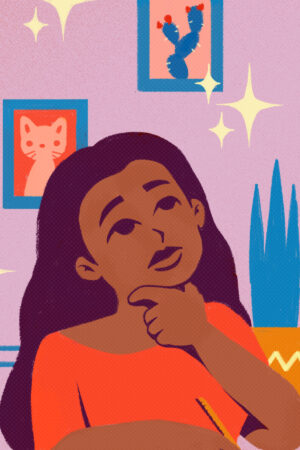Natalie Diaz’s much anticipated second collection of poetry, Postcolonial Love Poem, is an exploration and celebration of love, as well as a critique of the factors that threaten it—specifically, settler colonialism and the United States’ violent history of oppression against Native peoples.
In poems such as “exhibits from the American Water Museum,” Diaz also explores environmental racism, jumping in time and space from the protests against the Dakota Access Pipeline to the poisoned water of Flint, Michigan.
Yet, she warns us that love is more than just a type of resistance. It’s also an integral part of our own nature—as necessary to the body as air and water.
“A dangerous way of thinking lately is that we love as resistance,” she tells Remezcla over email. “I understand that, but I refuse to let my love be only that… I am loving because I was made to love; love was made for me. My Creator made us from clay, so that we might love this life, and this land.”
Throughout the book, out March 3, Diaz’s poems demonstrate how we endanger both ourselves and the natural world when we are careless with the earth.
In “The First Water is the Body,” Diaz, who is Mojave, writes: “I carry a river. It is who I am. ‘Aha Makav. This is not metaphor.” It is not a cute trick of language or wordplay. She ends: “Do you think the Water will forget what we have done? What we continue to do?”
Postcolonial Love Poem is an extraordinary collection that continues the work of Diaz’s first book, When My Brother Was an Aztec—in which she examines the erasure of Native voices, addiction and the legacy of trauma inherited from generations of genocide.
Diaz spoke with Remezcla ahead of the book’s release and further discussed the power of poetry and the necessity of love.
When I read your collection I kept thinking about James Baldwin and this quote from The Fire Next Time: “Love Takes off all the masks that we fear we cannot live without and know we cannot live within.” It also made me think about his novel Another Country, which seems to ask the question: Given the violent history of racism, how can we even begin to love each other? What inspired you to write about love in this collection?
I have been lucky in that I have been loved strongly, furiously even, while not necessarily perfectly and maybe not always well. I have learned love is a shifting type of luck and abundance, a thing my people, my family, my mother, cultivated in the desert. The desert is a place where you cannot hide from yourself. All of you is there, to be seen, to see. You can see the storm coming from miles and hours away. You always know your time because your shadow is tethered to your ankles, you can’t escape that shadow part of you. And sometimes, depending on where the sun is in its transit across the sky, your shadow side is even larger than you. I know the Baldwin quotes you are referencing, and the other sentences and ideas they are couched in, and I turn to Baldwin because he reminds me of both my past, my people’s pasts, and also what none of us can yet imagine of our future. He was willing to exist in the tension of this country so that we might make our way beyond it.
A dangerous way of thinking lately is that we love as resistance. I understand that, but I refuse to let my love be only that. I am not loving against America or even in spite of it. I am loving because I was made to love, love was made for me. My Creator made us from clay, so that we might love this life, and this land. He unloosed a river, so that we might take care of it and be taken care of. I think that is love. To be and move like a river. A thing thirsted for and yet capable of sating. A thing wild and yet able to lift the seed into its life. How can I not write about love, when I am lost in it every day, lost in that I can’t imagine how to do it, and also lost in it in that I am overflowing with it. I am so lucky to have who I have in this world and what I have—a people, a family, a land, that [holds] me in love, or something that love can only estimate.
They say that every book teaches the writer something new about themselves and their writing. Was this true for you about Postcolonial Love Poem?
I learn something new about myself in most minutes. This book is a small glinting of my thoughts and wonders. I consider it a moving thing. Maybe the font of it stands still, but when I return to it, it doesn’t stand still, it asks me questions, it demands things of me, it is its own thing, and I am now outside of it, experiencing it, chasing it, or being chased by it or running alongside it. It isn’t a teacher but it knows things I might someday come to.
You write that “From the Desire Field” and “Isn’t the Air Also a Body Moving” were part of a series of letter poems you exchanged with Ada Limon? What was that project like exchanging poetry with a friend and how did it come to be?
The book, and my practice of writing and language, are such that I am demanding of myself—and sometimes failing—to treat everybody like the body of the beloved. Ada is a friend and I love her. Why not speak to her as if she were my mother, my sister, my lover, my friend? Why can’t I love them all as hard and as impossibly? This exchange made me more—as love does, as Ada does.
What were the most difficult poems for you to write in this collection and why?
Is poetry difficult? I don’t know. I mean, it’s not easy. I don’t know what you mean by which were difficult, maybe emotionally, or technically, or… It’s difficult to be a poet, right? When the world needs so many things and all I have to offer are poems. Maybe that is what I find most difficult about my poems lately. I can’t eat them. I can’t knock down a border wall with them. I can’t ease my brother with them. Also, what a lucky thing that I write poems. That for the duration of the writing, and even reading others’ poems, I am in a space of pleasure, out of time, beyond what this country can do to me. Maybe the question is not about difficulty, or at least I am less interested in what is difficult. I think I’m trying to find a question that lets me ask if what I’m doing matters.
In one poem you write: “You cannot drink poetry”? Yet, still by writing this book it seems there’s the hope that poetry can achieve something. What role do you see poetry playing as the earth becomes increasingly compromised by the manmade disaster of global warming?
Poetry, as I said above, is lucky. My parents don’t have the luck of poetry, but I do know they take joy in knowing I have this thing. They are proud of me, even though they aren’t quite sure what I am doing. They see the passion I have for it. And passion and fire and fight mean success to my family. We are fighters. I personally believe in language, which is a gift I received from my family, even though it has manifested in a type of language they don’t often have access to. Poetry should belong to more people. I learned poetry from my mother even though she was denied poetry. I believe less in poetry and more in the power of language. Poetry is one way of language, but one small way. It isn’t an action, but it can lead to one, or it can be a part of one. My hope in poetry right now is that it will become itself.







